The Umbrellas of Cherbourg: Ephemeral Romance and Enduring Truth
Pastel Dreams, Pragmatic Realities
Pastel Illusion and Vespertine Longing
Nota bene: The Umbrellas of Cherbourg dazzles the eye with its effervescent color palette with peach-pink facades, lemony shopfronts, and sky-blue interiors. Beneath this vespertine glow of perpetual twilight, Jacques Demy sets the stage for love stories that initially feel dreamlike. The characters sing in a near demotic cadence, transforming everyday exchanges: taxes, family shops, or sleepless nights—into floating melodies that lull us into believing in a permanent rosy haze.
The pastel tones serve a subtle purpose: they cloak the undercurrent of practical concerns that slowly emerge. A once-carefree couple, Geneviève and Guy, begin the tale in a quondam state of devotion, convinced their bond can weather any storm. Little do they suspect how swiftly illusions fade when confronted by forces beyond their control.
Songs and Lyrics: A Continuous Melody
One of the most striking elements of The Umbrellas of Cherbourg is how every line of dialogue is sung-through. Rather than inserting musical numbers between spoken scenes, Demy chose a form of recitative that turns even the most mundane exchanges into lilting melodies. This approach casts a gentle enchantment over the narrative, drawing viewers into a hypnotic state where paying the electric bill or discussing the day’s shopping list feels like a sweeping, dramatic moment.
In effect, the entire film becomes a song about ordinary life’s hidden drama. By weaving music into every syllable, Demy underscores how dreams and routine coexist within the same quotidian grind. Geneviève and Guy’s early duets fuse longing with practicality; she might sing about the shop’s finances or mention time constraints, but the melody threads her concerns with the sweep of romantic desire. It’s an artful way of suggesting that love can be overshadowed by life’s mechanics, even while it tries to soar.
As the story progresses and real hardships intrude, the musical continuity heightens the contrast between hope and regret. The lyricism remains constant, a kind of lifeline tethering characters to the possibility of magic. Still, each note also reminds us that circumstances can shift in an instant, turning a duet of devotion into a bittersweet refrain of acceptance or quiet resignation. The uniform musicality thus magnifies the central tension: can passion triumph over the grinding realities of duty and change? In Demy’s world, the answer isn’t a simple yes or no; instead it’s a delicate balance between song and the banal demands of life.
Sub Rosa Tensions: Security vs. Passion
At first, Geneviève and Guy’s love flourishes in the open, but rising pressures soon begin to adumbrate the fragile nature of their bond. Financial insecurity looms over Geneviève’s household. When Guy is present, it all seems surmountable, but the moment he is away, her mother’s shop struggles intensify. Roland Cassard steps in— courteous, successful, and a guarantee of stability.
The film never paints Geneviève’s choice as pusillanimous; rather, it illuminates the quiet pull of practical necessity. Love and passion might be enthralling, but the promise of security exerts an undeniable gravitational pull. Over time, Geneviève’s family steers her closer to Roland, and an internal conflict forms between the tenderness she feels for Guy and the steady future another man offers.
War, Duty, and Serendipity
Guy’s military service places him not just on a battlefield, but emotionally hors de combat - out of the fight by circumstance, not choice.. He departs believing his relationship with Geneviève is unassailable, presuming time and distance can’t erode a bond so strong. The powerful truth is that while he’s fulfilling his obligation to country, life marches on at home. His absence, drawn out by the Algerian war’s unpredictable demands, becomes the very gap through which Geneviève’s sense of hope leaks away.
We often imagine our love lives as entirely ours to command. Guy’s story illustrates that capricious serendipity—the unforeseen call to duty, the prolonged separation—can step in and rewrite what we thought was a sure script. In that sense, The Umbrellas of Cherbourg deftly shows how fate can whisk us from the stage mid-performance, leaving us unable to reclaim our part once the world has moved on without us.
The Lure of Fate
This film quietly questions whether passion alone can anchor two people against the shifting tides of circumstance. The pastel hues, the ceaseless music; these elements might lull us into trusting that devotion will find a way. Over time, however, Demy’s direction reveals love to be as vulnerable to chance as it is buoyed by hope. One missed epistle, one lingering doubt, and the precarious dream unravels.
It’s tempting to call such outcomes tragic, but the story stops shy of outright cynicism. By highlighting how love can be undercut by events far beyond a couple’s influence, The Umbrellas of Cherbourg opens up the realm of possibility for something new—love transformed, love diverted. Far from fixating on heartbreak alone, the film acknowledges that the human heart remains resilient, even if it must adapt to the vicissitudes of destiny.
-“Guy, I love you. You smell of gasoline.”
-“It's just another perfume.”
Guy: A Quiet Ideal of Masculinity
In a film so rich in aesthetic detail and romantic yearning, it's easy to overlook Guy as a quiet exemplar of masculine grace. But his arc deserves special attention—not as the tragic lover pining from afar, but as a man who bears the weight of fate with quiet dignity. He doesn't lash out, doesn't retreat into bitterness. He feels deeply, and never masks that vulnerability behind the brittle armor of faux-stoicism.
Guy is hurt by Geneviève's decision, that much is clear. He returns home to find the woman he loves gone, their dream dissolved in his absence. And yet, he doesn’t collapse into resentment or rage. He mourns, he reflects, and then he carries on—working, rebuilding, loving again. There’s no trace of the wounded pride or passive-aggressive cruelty we might expect from a man scorned. He treats the new woman in his life with tenderness, never using her as a balm or rebound. His ability to move forward without hardening is, in its own way, heroic.
“Why is absence so heavy to bear?”
What strikes me most about Guy is how comfortable he seems in his own masculinity. He doesn’t posture. He doesn’t need to dominate or command attention. Even so, he remains centered, strong. He’s a man who has integrated his own anima—his feminine side—without sacrificing the integrity of his masculine core. That kind of integration is rare. It speaks to a character forged not just by loss, but by an acceptance of life’s ambiguity. He doesn’t demand justice for his heartbreak. He doesn’t turn cold. He simply keeps walking, quietly noble.
In an age where masculinity is so often caricatured as either domineering or disaffected, Guy stands apart. He shows that to be a man is not to wall off one’s heart, but to carry its weight without complaint. His strength lies not in beaux-gestes, but in the refusal to let pain curdle into resentment. In this sense, Guy is a subtle hero: not of conquest, but of quiet endurance.
Geneviève’s Unwavering Course
After enduring months of uncertainty, Geneviève makes her choice and marries Roland. The pastel shops and demotic choruses continue, but they now frame a different story: a woman who has entrusted her future to what appears the surer bet. When Guy eventually returns, hoping to reconnect with the woman he left behind, he finds Geneviève unwavering in her decision. It isn’t so much coldness as a pragmatic finality; the commitments she’s made cannot simply be undone at a whim.
This aspect of the film highlights a curious pull: viewers might cheer for the original lovers to reunite, but the film shows us that certain paths, once taken, won’t reverse course so easily. Geneviève, having bound herself to a new life, remains faithful to the reality she’s chosen—even if it was guided by pressing financial need rather than irrepressible affection. In its soft, pastel-shaded way, the film suggests that once a person has crossed a threshold in love and livelihood, there may be no turning back.
The Child, and the Husband Who Accepts
Geneviève’s decision is further complicated by her pregnancy, a fact that underscores just how entwined she and Guy once were. With Guy absent, she faces the prospect of raising a child under the shadow of social stigma—an out-of-wedlock baby would carry the weight of whispered judgments in her community. Then there’s Roland, fully aware of her condition, he steps in with an air of unwavering grace. His acceptance of the child—though not his own—becomes an act of both compassion and commitment.
“We'll raise this child together. He'll be ours. Please accept, Genevieve. I don't want to upset you. I love you, Genevieve.”
In embracing Geneviève’s situation, Roland offers a stable home and a family name, effectively removing the label of “bastard” from the child’s future. The film never descends into moralizing about this choice; instead, it presents Roland’s generosity as one more layer of the pragmatic world Geneviève has entered. Her heart may still carry echoes of Guy, but the tangible security Roland provides for her and her baby cannot be dismissed as mere convenience. In a story so infused with chance and compromise, Roland’s steady acceptance shines as a measured kindness—proof that even within the constraints of necessity, small mercies can still flourish.
I’ll admit I find Roland’s choice both admirable and unsettling. On one level, I respect the strange honor in his willingness to father another man’s child; he foregoes the typical male caution about raising a child that isn’t genetically his. Though on a more visceral level, I simply don’t posses the ability to do the same. It’s not just about ego or self-preservation but a sense of lineage and one’s own legacy. Still, it’s hard to ignore the dignity in Roland’s refusal to let this child endure the stigma of illegitimacy. Even if I remain conflicted, I can’t deny the nobility in his actions: he offers Geneviève a life of stability, and in doing so, shoulders a burden most men would instinctively reject. That quiet valor; though it runs counter to some of my own instincts—speaks to a spiritual grace that goes beyond conventional expectations.
Perhaps what moves me most is not just Roland’s grace, but Geneviève’s quiet acceptance of this new life. It’s not born of reckless passion, but of fragile, hard-earned peace.
A Personal Reflection: Love vs. the Droll Realities
Watching The Umbrellas of Cherbourg always sends me back to my own halcyon romances—one that sparkled with the same pastel optimism Geneviève and Guy share. In those long-ago chapters, it felt like neither distance nor duty could dampen the rush of shared ambition and endless talks under starlit skies. Time slipped by, and our commitments accumulated. Little by little, practical concerns, such as: rent, careers, family obligations claimed our attention. We lost the rhythm that once seemed unbreakable.
Even now, I still carry these women in my heart. Though we drifted apart, I can’t help cherishing the memories we forged when everything seemed possible. Like Geneviève and Guy, we had to make real choices, and sometimes we chose security over the heady sweep of passion. It took years for me to realize that letting go wasn’t a betrayal of our love but an acknowledgment that life doesn’t pause for even the most fervent devotion.
Through that experience, I learned there’s a way to hold someone in affirmation despite an ending that felt achingly extraneous. We adapt, we move on, and the romance settles into a quiet corner of us; a bittersweet reminder that love, no matter how fleeting, can imprint us forever. Once we let another enter our heart—rarely, do they truly ever depart.
Final Exegesis: When Illusion Fades
For all its melody and vibrancy, The Umbrellas of Cherbourg offers more than a whimsical diversion. In the end, it stands as an exegesis of how love can be both enchanting and precarious—glittering in the evening light, only to recede when confronted by time, distance, and invariant necessity. The soft hued veneer that once promised an unbreakable bond eventually frames two people who have, in their own ways, moved on.
Demy refrains from casting blame. If Geneviève and Guy drift apart, it’s as much a testament to life’s ebb and flow as to any failing on their part. Their final meeting crystallizes a universal truth: sometimes, the future we planned is quietly overthrown by obligations, by chance, or by pragmatic choices.
Beneath the cheerful soundtrack and the enchanting color design, this film pulses with the knowledge that romance, however bright, can yield to the strong pull of circumstance. In its honesty, The Umbrellas of Cherbourg edifies us; showing that the sweetest dreams often dissolve, but in doing so, they make room for new realities—even if they wear a more subdued nuance.
-”What did you name her?”
-”Francoise. She's a lot like you”


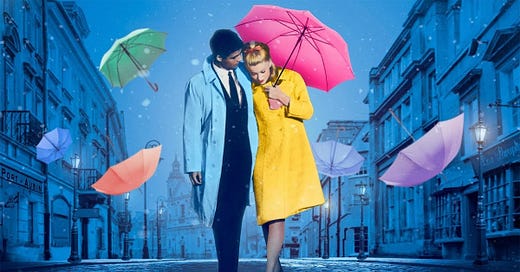



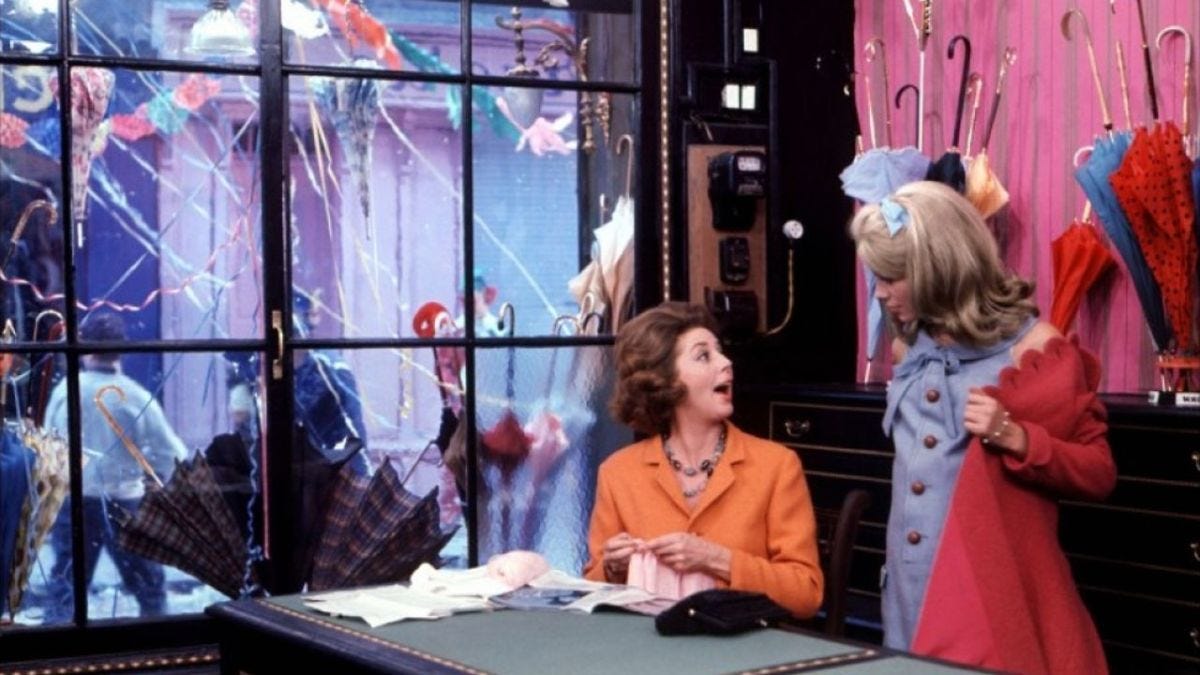


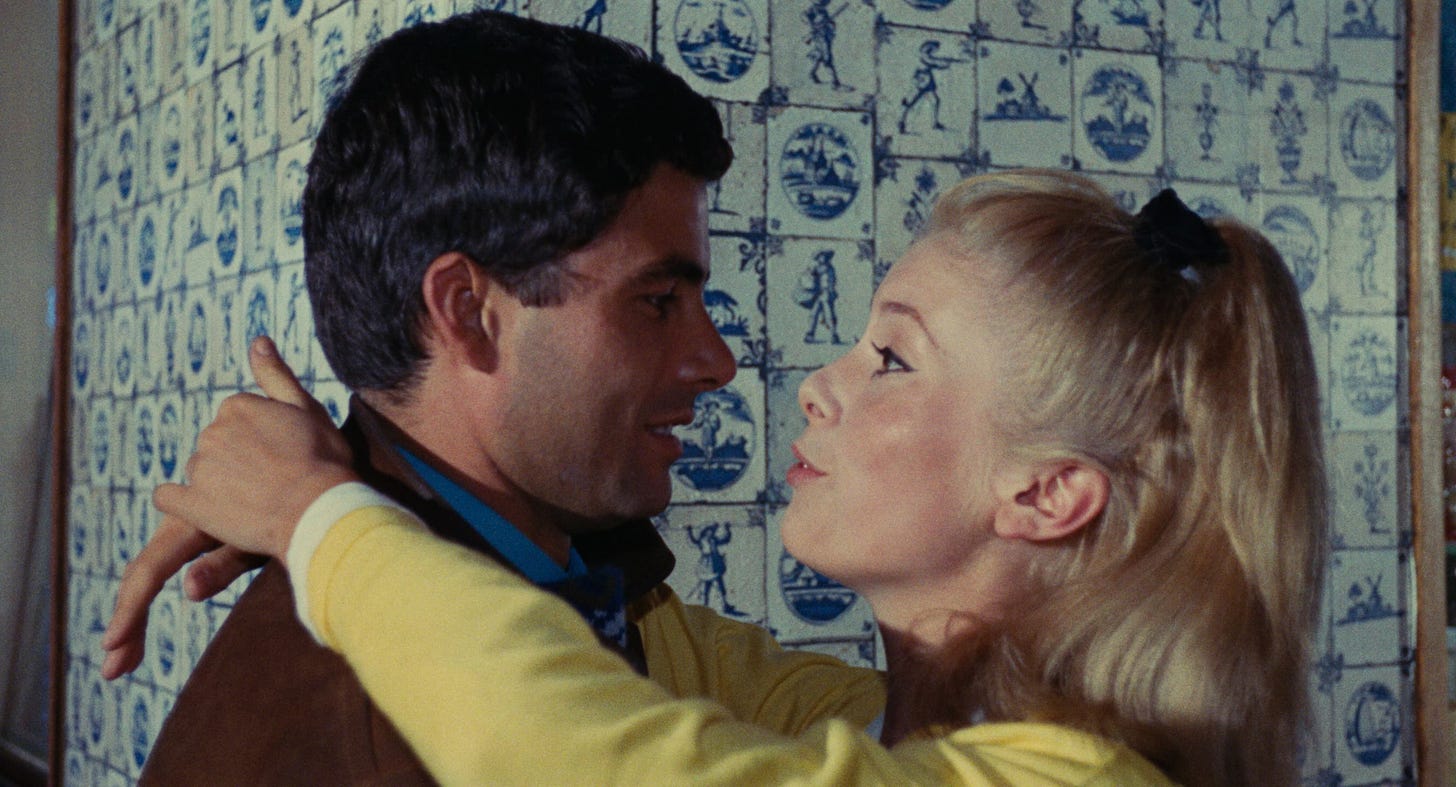


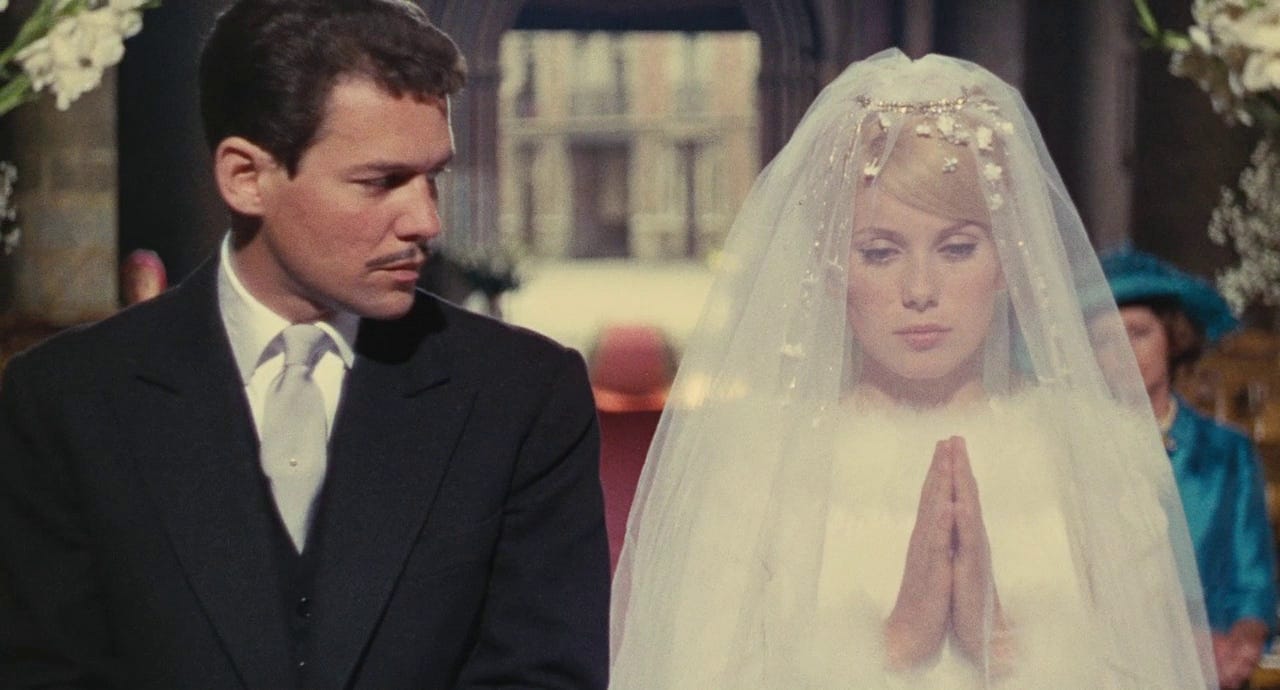
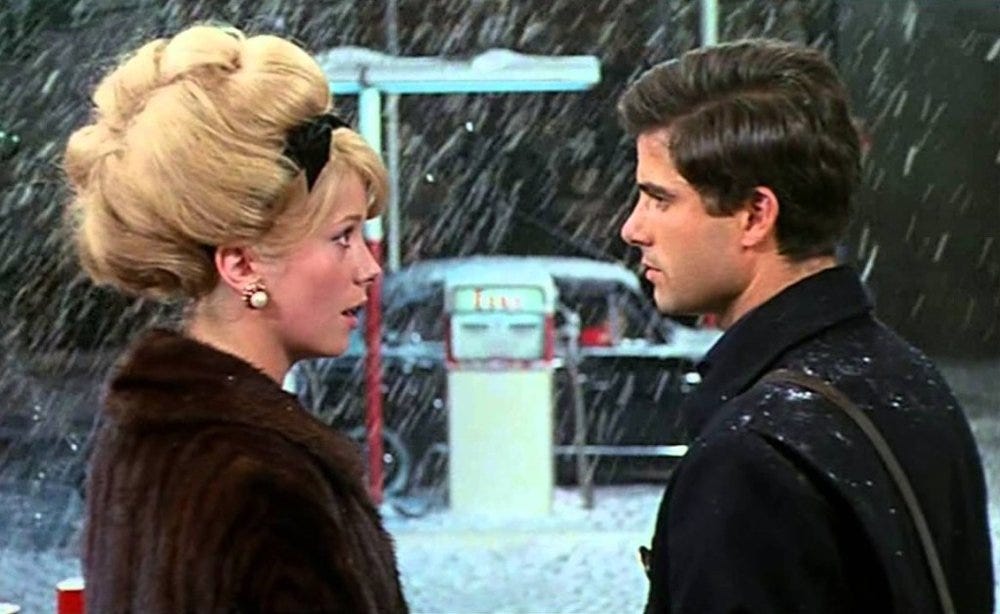
Great article.
Oh god, I used to love this movie. I watched it many times with my college girlfriend — who ended up marrying a rich guy instead of me. I’ve happily watched Demy’s goofier follow-up, *Demoiselles de Rochefort*, many times since, but never *Parapluies*, not in over 25 years. I don’t know what would happen to me if I ever watched it again.